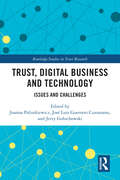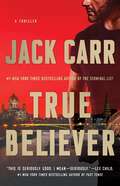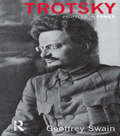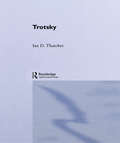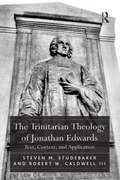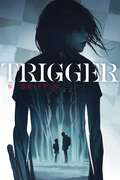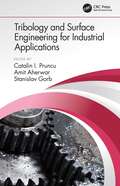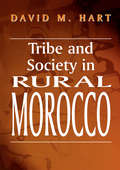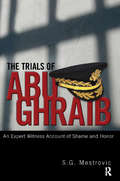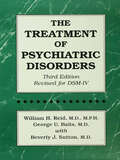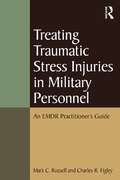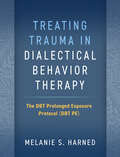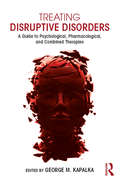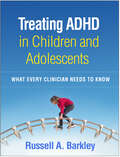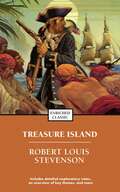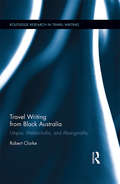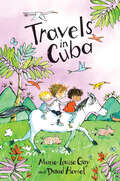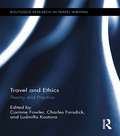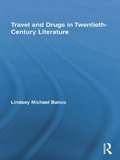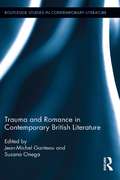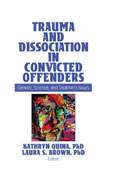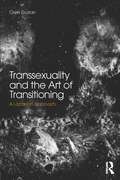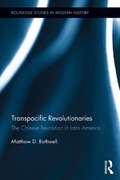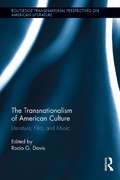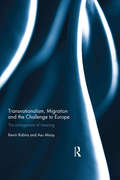Special Collections
Benetech’s Global Certified Accessible Titles
Description: Benetech’s GCA program is the first independent third-party EPUB certification to verify ebook accessibility. By creating content that is born accessible, publishers can meet the needs of all readers. Learn more: https://bornaccessible.benetech.org/
- Table View
- List View
Trust, Digital Business and Technology
by Joanna Paliszkiewicz, Jose Luis Guerrero Cusumano, and Jerzy GołuchowskiTrust, Digital Business and Technology: Issues and Challenges presents and discusses the main issues and challenges related to digital trust and information technologies. The subject of trust is relevant to both practitioners and researchers. It is widely recognized and confirmed that trust, especially mutual trust, when it is built at the right level, reduces the risk of interaction and increases the collaboration between partners. Readers will gain from this book theoretical and practical knowledge on digital trust; theoretically, well-grounded knowledge on digital trust and related concepts, empirically validated by practice. Most authors have taken innovative approaches to consider issues highlighting a selected aspect of the core theme of this book. The intended audiences of this book are professionals, scholars, and students.
True Believer
by Jack CarrINSTANT BESTSELLER &“Take my word for it, James Reece is one rowdy motherf***er. Get ready!&” —Chris Pratt, star of the #1 Amazon Prime series The Terminal List &“Jack Carr and his alter-ego protagonist, James Reece, continue to blow me away.&” —Mark Greaney, #1 New York Times bestselling author of Mission Critical In #1 New York Times bestselling author Jack Carr&’s follow-up to The Terminal List, former Navy SEAL James Reece&’s skill, cunning, and heroism put the US government back in his debt and set him on another path of revenge. When a string of horrific terrorist attacks plagues the Western world during the holiday season, the broader markets fall into a tailspin. The attacks are being coordinated by a shadowy former Iraqi commando who has disappeared into Europe&’s underground. The United States government has an asset who can turn the Iraqi against his masters: James Reece, the most-wanted domestic terrorist alive. After avenging the deaths of his family and team members, Reece emerges deep in the wilds of Mozambique, protected by the family of his estranged best friend and former SEAL Team member. When a series of events uncovers his whereabouts, the CIA recruits him, using a Presidential pardon for Reece and immunity for the friends who helped him in his mission of vengeance. Now a reluctant tool of the United States government, Reece travels the globe, targeting terrorist leaders, unraveling a geopolitical conspiracy that exposes a traitorous CIA officer, and uncovering a sinister assassination plot with worldwide repercussions. A high-intensity roller-coaster race against time, True Believer is &“one of this year&’s hottest thrillers, and a perfect fit for fans of Vince Flynn, Brad Thor, and Daniel Silva&” (The Real Book Spy).
Trotsky
by Geoffrey SwainWithout Trotsky there would have been no Bolshevik Revolution, but Trotsky was no Bolshevik. Providing a full account of Trotsky’s role during the Russian Civil War and concentrating on his time as an active participant in Russian revolutionary politics, rather than his ideological writings of emigration, Swain gives the student a very different picture of the Bolshevik Commissar of War. This radically new interpretation of Trotsky’s career spanning 1905-1917 incorporates the tense relationship between Trotsky and Lenin until 1917, and pays particular attention to the Russian Civil War and Trotsky’s military organisation and contribution to the war. Swain argues critically that Trotsky achieved where Lenin would have failed, suggesting that Trotsky was in the main part responsible for the Bolshevik Revolution.
Trotsky
by Ian D. ThatcherThis new biography provides a full account of Leon Trotsky's political life, based upon a wealth of primary sources, including previously unpublished material. Ian D. Thatcher paints a new picture of Trotsky's standing in Russian and world history. Key myths about Trotsky's heroic work as a revolutionary, especially in Russia's first revolution of 1905 and the Russian Civil War, are thrown into question. Although Trotsky had a limited understanding of crucial contemporary events such as Hitler's rise to power, he was an important thinker and politician, not least as a trenchant critic of Stalin's version of communism.
The Trinitarian Theology of Jonathan Edwards
by Steven M. Studebaker and Robert W. IiiWhile Jonathan Edwards scholars have increasingly recognized the central role that the Trinity played in his thought, no work brings together Edwards' central texts on the Trinity and interprets and applies them to contemporary theological issues. This book reveals how the doctrine of the Trinity transformed Edwards' ministry and how the Trinity can inform current evangelical thought, life, and ministry. Key primary texts, interpretation, and application of Edwards' trinitarian theology are all presented here. Part one features Edwards' chief trinitarian writings and provides an in-depth analysis on his doctrine. Part two sets Edwards' trinitarianism in historical context. Part three demonstrates how Edwards employed the Trinity in his sermons, in spiritual formation, and in other areas of doctrine.
Trigger
by N. GriffinThe Queen&’s Gambit meets The Hunger Games in this harrowing young adult thriller about a teen girl whose abusive father teaches her the finer points of chess and hunting for his own sinister ends.Didi tries her best to be a good girl, but it&’s hard to keep track of her father&’s rules. When she wins a chess tournament, he&’s angry she didn&’t win with a better move and makes her run laps around the house. When she runs laps the next day, she has to keep running until she&’s faster than the day before. When she&’s skilled enough to outshoot him with both a gun and bow and arrow, he grows furious when she won&’t then shoot a baby rabbit who crosses their path. And Didi can&’t do anything to escape being threatened with the Hurt Stick when she misbehaves. He&’s all she has, he reminds her. They have to be prepared. They have to be prepared to fight the rest of the world, when the world comes to an end. He&’s grooming her, to keep her safe. He loves Didi. He does—he says so! And so Didi runs harder; annihilates her opponents in chess; takes down a deer at a dead run. He&’s grooming her, after all, to be the best…he says so.
Tribology and Surface Engineering for Industrial Applications
by Catalin I. Pruncu, Amit Aherwar, Stanislav GorbTribology is a multidisciplinary science that encompasses mechanical engineering, materials science, surface engineering, lubricants, and additives chemistry with tremendous applications. Tribology and Surface Engineering for Industrial Applications discusses the latest in tribology and surface engineering for industrial applications. This book: Offers information on coatings and surface diagnostics Explains a variety of techniques for improved performance Describes applications in automotive, wheel and rail materials, manufacturing, and wind turbines Written for researchers and advanced students, this book encompasses a wide-ranging view of the latest in industrial applications of tribology and surface engineering for a variety of cross-disciplinary applications.
Tribe and Society in Rural Morocco
by David M. HartAn anthropological study of Berber society and particularly the Rifian tribes of Morocoo, a Muslim society. This book deals with the background of these tribes, their settlement in various areas and contemporary issues.
Trials of Abu Ghraib
by S. G. Mestrovic'Offers a front row seat at the courts martial of those accused in America's notorious prison abuse scandal.' -Adam Zagorin, senior correspondent, Time Magazine 'A must-read for all those committed to restoring a sense of honor to our country and the Armed Forces of the United States following the national embarrassment of Abu Ghraib. The unlawful directives and policies issued by the senior civilian leaders in the Department of Defense, and their flawed strategy that took our nation to war, set the conditions for abuse that would have disastrous consequences on the war in Iraq and the future of the Middle East. Amazingly, as of this writing, senior leaders have yet to be held accountable. Read this book, become better informed, and energize your elected officials to do the right thing.' -Major General John Batiste, U.S. Army (Retired) S. G. Mestrovic's story of three principal trials-those of convicted soldiers Lynndie England, Javal Davis, and Sabrina Harman-stands among the most poignant trial narratives ever told. During the trials Mestrovic, an expert witness on behalf of the three soldiers, had access to documents and records unavailable to the press and the public. He reveals the evidence, some suppressed from testimony, that the abuse at Abu Ghraib is part of a widespread pattern of abuse, imported from Guantanamo, that made its way to Afghanistan and Iraq.
The Treatment Of Psychiatric Disorders
by William H. Reid and George U. Balis and Beverly J. SuttonThis is the third edition, revised for the DSM-IV, of the one volume, standard, comprehensive text on the treatment of psychiatric disorders - spanning the biological, psychological and psychosocial.; Updated and revised, this book is the result of several thousand studies, clinical reports, and reference works. Information is specifically coordinated with the DSM-IV, and the authors' discussion reflects what is currently known about standard treatments as well as many of the more esoteric therapies.
Treating Traumatic Stress Injuries in Military Personnel
by Charles R. Figley and Mark C. RussellTreating Traumatic Stress Injuries in Military Personnel offers a comprehensive treatment manual for mental health professionals treating traumatic stress injuries in both male and female veterans. It is the first book to combine the most recent knowledge about new paradigms of combat-related traumatic stress injuries (Figley & Nash, 2006) and offers a practical guide for treating the spectrum of traumatic stress injuries with EMDR, which has been recognized by the Department of Veterans Affairs and Department of Defense clinical practice guidelines as one of the most studied, efficient, and particularly well-suited evidence-based treatments for military-related stress injuries. Russell and Figley introduce an array of treatment innovations designed especially for use with military populations, and readers will find pages filled with practical information, including appendices that feature a glossary of military terminology, breakdowns of rank and pay grades, and various clinical forms.
Treating Trauma in Dialectical Behavior Therapy
by Melanie S. HarnedMany DBT clients suffer from posttraumatic stress disorder (PTSD), but until now the field has lacked a formal, tested protocol for exactly when and how to treat trauma within DBT. Combining the power of two leading evidence-based therapies--and designed to meet the needs of high-risk, severely impaired clients--this groundbreaking manual integrates DBT with an adapted version of prolonged exposure (PE) therapy for PTSD. Melanie S. Harned shows how to implement the DBT PE protocol with DBT clients who have achieved the safety and stability needed to engage in trauma-focused treatment. In a convenient large-size format, the book includes session-by-session guidelines, rich case examples, clinical tips, and 35 reproducible handouts and forms that can be downloaded and printed for repeated use.
Treating Disruptive Disorders
by George KapalkaTreating Disruptive Disorders is a practical book for busy clinicians—psychiatrists, psychologists, mental health counselors, clinical social workers, and more—as well as students, interns, or residents in the mental health professions. It distills the most important information about combined as well as solitary treatments of a variety of psychological disorders characterized by disruptive behaviors, including those where disruptive aspects are part of core symptoms (like ADHD, ODD, or conduct disorder), and those where disruptive features are commonly associated with core symptoms (like mood, personality, and cognitive/developmental disorders). In addition to an analysis of the best in evidence-based practice and research, the volume also includes brief clinical vignettes to help present the material in an easily accessible, understandable, readable, and relevant format. The chapter authors are experts in the treatment of these disorders and review a wide variety of empirically supported treatments for children, adolescents, and adults.
Treating ADHD in Children and Adolescents
by Russell A. BarkleyFrom foremost authority Russell A. Barkley, this book presents essential principles and practices for managing attention-deficit/hyperactivity disorder (ADHD) in children and teens. Barkley interweaves the best scientific knowledge with lessons learned from decades of clinical practice and research. He provides guidelines and clinical tips for conducting thorough, accurate assessments and developing and implementing science-based treatment plans. The book is grounded in Barkley's theory of ADHD as a disorder of executive functioning and self-regulation. Ways to collaborate successfully with parents and other professionals are highlighted throughout. In a convenient large-size format, the volume includes 45 reproducible handouts and forms that can be downloaded and printed for repeated use.
Treasure Island
by Robert Louis StevensonEnriched Classics offer readers accessible editions of great works of literature enhanced by helpful notes and commentary. Each book includes educational tools alongside the text, enabling students and readers alike to gain a deeper and more developed understanding of the writer and their work.Climb aboard for the swashbuckling adventure of a lifetime. Treasure Island has enthralled (and caused slight seasickness) for decades. The names Long John Silver and Jim Hawkins are destined to remain pieces of folklore for as long as children want to read Robert Louis Stevenson’s most famous book. With its dastardly plot and motley crew of rogues and villains, it seems unlikely that children will ever say no to this timeless classic. Enriched Classics enhance your engagement by introducing and explaining the historical and cultural significance of the work, the author’s personal history, and what impact this book had on subsequent scholarship. Each book includes discussion questions that help clarify and reinforce major themes and reading recommendations for further research. Read with confidence.
Travel Writing from Black Australia
by Robert ClarkeOver the past thirty years the Australian travel experience has been 'Aboriginalized'. Aboriginality has been appropriated to furnish the Australian nation with a unique and identifiable tourist brand. This is deeply ironic given the realities of life for many Aboriginal people in Australian society. On the one hand, Aboriginality in the form of artworks, literature, performances, landscapes, sport, and famous individuals is celebrated for the way it blends exoticism, mysticism, multiculturalism, nationalism, and reconciliation. On the other hand, in the media, cinema, and travel writing, Aboriginality in the form of the lived experiences of Aboriginal people has been exploited in the service of moral panic, patronized in the name of white benevolence, or simply ignored. For many travel writers, this irony - the clash between different regimes of valuing Aboriginality - is one of the great challenges to travelling in Australia. Travel Writing from Black Australia examines the ambivalence of contemporary travelers' engagements with Aboriginality. Concentrating on a period marked by the rise of discourses on Aboriginality championing indigenous empowerment, self-determination, and reconciliation, the author analyses how travel to Black Australia has become, for many travelers, a means of discovering 'new'--and potentially transformative--styles of interracial engagement.
Travels in Cuba
by David Homel and Marie-Louise GayEven for an experienced traveler like Charlie, Cuba is a place unlike any he has visited before — an island full of surprises, secrets and puzzling contradictions. When Charlie’s artist mother is invited to visit a school in Cuba, the whole family goes along on the trip. But the island they discover is a far cry from the all-inclusive resorts that Charlie has heard his friends talk about. Charlie has never visited a country as strange and puzzling as Cuba — a country where he often feels like a time traveler. Where Havana’s grand Hotel Nacional sits next to buildings that seem to be crumbling before his very eyes. Where the streets are filled with empty storefronts and packs of wild dogs, but where flowers and sherbet-colored houses may lie around the next corner, and music is everywhere. Where there are many different kinds of walls — from Havana’s famous sea wall to the invisible ones that seem aimed at keeping tourists and locals apart. Then the family heads “off the beaten track,” traveling by hot, dusty bus to Viñales, where Charlie makes friends with Lázaro, who often flies from Miami to visit his Cuban relatives. The boys ride a horse bareback, find a secret cache of rifles inside a little green mountain and go swimming with small albino fish in an underground cave. A rent-a-wreck takes the family into the countryside, where they find an abandoned hotel inhabited by goats, and a modern resort filled with tourists. And as he goes from one strange and marvelous escapade to another, Charlie finds that his expectations about a place and its people are overturned again and again. Key Text Features illustrations Correlates to the Common Core State Standards in English Language Arts: CCSS.ELA-LITERACY.RL.5.6 Describe how a narrator's or speaker's point of view influences how events are described.
Travel and Ethics
by Charles Forsdick and Corinne Fowler and Ludmilla KostovaDespite the recent increase in scholarly activity regarding travel writing and the accompanying proliferation of publications relating to the form, its ethical dimensions have yet to be theorized with sufficient rigour. Drawing from the disciplines of anthropology, linguistics, literary studies and modern languages, the contributors in this volume apply themselves to a number of key theoretical questions pertaining to travel writing and ethics, ranging from travel-as-commoditization to encounters with minority languages under threat. Taken collectively, the essays assess key critical legacies from parallel disciplines to the debate so far, such as anthropological theory and postcolonial criticism. Also considered, and of equal significance, are the ethical implications of the form’s parallel genres of writing, such as ethnography and journalism. As some of the contributors argue, innovations in these genres have important implications for the act of theorizing travel writing itself and the mode and spirit in which it continues to be conducted. In the light of such innovations, how might ethical theory maintain its critical edge?
Travel and Drugs in Twentieth-Century Literature
by Lindsey Michael BancoThis book examines the connections between two disparate yet persistently bound thematics -- mobility and intoxication -- and explores their central yet frequently misunderstood role in constructing subjectivity following the 1960s. Emerging from profound mid-twentieth-century changes in how drugs and travel were imagined, the conceptual nexus discussed sheds new light on British and North American responses to sixties counterculture. With readings of Aldous Huxley, William Burroughs, Alex Garland, Hunter S. Thompson, and Robert Sedlack, Banco traces twin arguments, looking at the ways travel is imagined as a disciplinary force acting upon the creative, destabilizing powers of psychedelic intoxication; and exploring the ways drugs help construct travel spaces and practices as, at times, revolutionary, and at other times, neo-colonial. By following a sequence of shifting understandings of drug and travel orthodoxies, this book traverses fraught and irresistibly linked terrains from the late 1950s up to a period marked by international, postmodern tourism. As such, it helps illuminate a world where tourism is continually expanding yet constantly circumscribed, and where illegal drugs are both increasingly unregulated in the global economy and perceived more and more as crucial agents in the construction of human subjectivity.
Trauma and Romance in Contemporary British Literature
by Susana Onega and Jean-Michel GanteauDrawing on a variety of theoretical approaches including trauma theory, psychoanalysis, genre theory, narrative theory, theories of temporality, cultural theory, and ethics, this book breaks new ground in bringing together trauma and romance, two categories whose collaboration has never been addressed in such a systematic and in-depth way. The volume shows how romance strategies have become an essential component of trauma fiction in general and traumatic realism in particular. It brings to the fore the deconstructive powers of the darker type of romance and its adequacy to perform traumatic acting out and fragmentation. It also zooms in on the variations on the ghost story as medium for the evocation of trans-generational trauma, as well as on the therapeutic drive of romance that favors a narrative presentation of the working-through phase of trauma. Chapters explore various acceptations and extensions of psychic trauma, from the individual to the cultural, analyzing narrative texts that belong in various genres from the ghost story to the misery memoir to the graphic novel. The selection of primary sources allows for a review of leading contemporary British authors such as Peter Ackroyd, Martin Amis, Ian McEwan, Salman Rushdie, Graham Swift, Sarah Waters and Jeanette Winterson, and of those less canonical such as Jackie Kay, Alan Moore and Dave Gibbons, Justine Picardie, Peter Roche and Adam Thorpe.
Trauma and Dissociation in Convicted Offenders
by Laura S. Brown and Kathryn QuinaBetter understand the men and women most affected by trauma in our society Convicted offenders quite often are found to have a history of trauma. Trauma and Dissociation in Convicted Offenders: Gender, Science, and Treatment Issues provides a comprehensive look at the connection between complex trauma and the likelihood of being a convicted offender. This unique text focuses on what factors increase the likelihood of being a convicted offender, and what treatment possibilities lay ahead for these individuals. Substance abuse, childhood sexual abuse, and other traumatic experiences and their links to incarcerated men and women are discussed in detail. Interventions and research within the corrections system are examined, with recommendations on how to better serve this population. Trauma and Dissociation in Convicted Offenders: Gender, Science, and Treatment Issues takes a reasoned stand on women and men in prison, understanding that while they are being punished for breaking the law, they also are survivors of trauma whose dysfunctions underscore the need for greater understanding and more research. This valuable source presents the most current research results while providing a clear view on important future directions of study and focus. Each chapter of this insightful resource is extensively referenced and many have tables to clearly present data. Topics in Trauma and Dissociation in Convicted Offenders: Gender, Science, and Treatment Issues include: the relationship between post-traumatic stress and lifetime substance abuse among incarcerated women research on women inmates with HIV sexual risk and hazardous drinking behavior study on the link between trauma and women domestic violence offenders dissociation and memory in sex abusers the &’re-criminalization&’ of mental illness the effectiveness of group therapy for incarcerated women survivors of childhood sexual abuse (CSA) challenges, ethical issues, and benefits of conducting research with abuse survivors in a women's prison facility Trauma and Dissociation in Convicted Offenders: Gender, Science, and Treatment Issues is an essential resource for clinicians, educators, students, policymakers, and researchers.
Transsexuality and the Art of Transitioning
by Oren GozlanWinner of The American Board and Academy of Psychoanalysis (ABAPsa) Book Prize for 2015 Transsexuality and the Art of Transitioning: A Lacanian approach presents a startling new way to consider psychoanalytic dilemmas of sexual difference and gender through the meeting of arts and the clinic. Informed by a Lacanian perspective that locates transsexuality in the intermediate space between the clinic and culture, Oren Gozlan joins current conversations around the question of sexual difference with the insistence that identity never fully expresses sexuality and, as such, cannot be replaced by gender. The book goes beyond the idea of gender as an experience that gives rise to multiple identities and instead considers identity as split from the outset. This view transforms transsexuality into a particular psychic position, able to encounter the paradoxes of transitional experience and the valence of phantasy and affect that accompany aesthetic conflicts over the nature of beauty and being. Gozlan brings readers into the enigmatic qualities of representation as desire for completion and transformation through notions of tension, difference and aesthetics through examining the artwork of Anish Kapoor and Louise Bourgeois and the role played by confusion in the aesthetics of transformation in literature and memoir. Each chapter of the book presents a productive take on understanding the psychoanalytic demand to sustain and consider the dilemma that the unconscious presents to the knowledge and recognition of gender. Fundamentally, this work understands transsexuality as a creative act, rich with desire and danger, in which thinking of the transsexual body as both an analytic and a subjective object helps us to reveal the creativity of sexuality. Ideal for psychoanalysts, psychologists, psychiatrists and social workers as well as students of psychoanalysis, cultural studies, literature studies and philosophy, Transsexuality and the Art of Transitioning offers a unique insight into psychoanalytic approaches to transsexuality and the question of assuming a position in gender.
Transpacific Revolutionaries
by Matthew RothwellThis book shows how Maoism was globalized during the 1949-1976 period, highlighting the agency of both Latin American and Chinese actors. While Maoism has long been known to have been influential in many social movements and guerrilla groups in Latin America, author Matthew Rothwell is the first to establish the way in which Latin American communists domesticated Maoism to Latin American conditions and turned Maoism into an influential political trend in many countries. By utilizing case studies of the formation of Maoist guerrilla groups and political parties in Mexico, Peru and Bolivia, the book shows how the movement of Chinese communist ideas to Latin America was the product of a highly organized effort that involved formal connections between Latin American activists and the People’s Republic of China. It represents a major contribution to three developing fields of historical inquiry: Latin America in the Cold War, the global 1960s, and Chinese Maoist foreign relations.
The Transnationalism of American Culture
by Rocío G. DavisThis book studies the transnational nature of American cultural production, specifically literature, film, and music, examining how these serve as ways of perceiving the United States and American culture. The volume’s engagement with the reality of transnationalism focuses on material examples that allow for an exploration of concrete manifestations of this phenomenon and trace its development within and outside the United States. Contributors consider the ways in which artifacts or manifestations of American culture have traveled and what has happened to the texts in the process, inviting readers to examine the nature of the transnational turn by highlighting the cultural products that represent and produce it. Emphasis on literature, film, and music allows for nuanced perspectives on the way a global phenomenon is enacted in American texts within the U.S, also illustrating the commodification of American culture as these texts travel. The volume therefore serves as a coherent examination of the critical and creative repercussions of transnationalism, and, by juxtaposing a discussion of creativity with critical paradigms, unveils how transnationalism has become one of the constitutive modes of cultural production in the 21st century.
Transnationalism, Migration and the Challenge to Europe
by Kevin Robins and Asu AksoyTransnationalism, Migration and the Challenge to Europe: The Enlargement of Meaning puts forward an alternative outline for thinking about migration in a European context. Moving beyond the agenda of identity politics, the book addresses possibilities more related to the experiential and existential dimensions of migratory – and importantly, post-migratory – lives. Examining the fundamental and radical argument that migrants should be regarded not as a problematical category, but rather as opening up new cultural and imaginative channels for those living in Europe, the book draws on extensive empirical work by the authors undertaken over the past ten years. Grounded in the actual lives and experiences of migrant Turks, the book evaluates how their articulations regarding identity and belonging have been changing over the last decade. The agenda regarding migration and belonging has shifted over this crucial period of time. This shift is counterpoised against the unchanging national positions, and against the supra-national stance of 'official' European approaches and policies regarding migration and identity. Transnationalism, Migration and the Challenge to Europe would be of interest to those involved in sociology, anthropology, transnational studies, migration studies, cultural studies, media studies, European studies.
